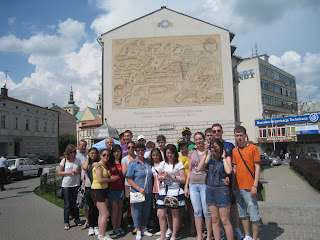In the second international project meeting participated 40 people: 6 staff and 34 learners from all 4 countries:Portugal, Romania, Cyprus and Poland.
Aims:
1/ getting know new hobbies, create art works,
2/ preparation to progress report
3/ evaluation process and activity
4/ promotion activity
Activities:
1/ Participation in festival of traditional food and handicraft / ECOGALA 2011/ in Rzeszów.
Foreign delegation with Polish learners acquired Polish traditional handmade handicraft: moppets, toys, paintings, wooden sculptures, artificial flowers and other decorations, jewellery and embroidery made by regional artists of Podkarpackie Province as their hobby.
Artists shared experience and information about materials used and ways of doing them.
The festival presented also Polish traditional food / cakes, jams, cold meats, mountain cheese… / made by farmers according to old recipes of their grandmothers. These delicious food was tasted by participants with taking some recipes to cook as a new hobby.
2/ Workshop at Ethnographical Museum in Rzeszów–
getting know the hobby of people living in past century/ comparing with other nations of participating countries, finding similarities and differences, exchanging opinions.
3/ Workshops during festival : presentation and teaching traditional Polish hobby
- workshop: wicker baskets
- workshop: flowers from the crepe- paper
- workshop: designing and making hats from a special kind of grass
- workshop: icon painting
The learners studied some examples of icon paintings, that shows different style and different techniques to do it.
- workshop: collecting information about Polish traditional food, Polish recipes as a hobby
of Polish women
4/ Participation in national festival in Giedlarowa / Lezajsk where traditional food was presented and folk dancing group performed. Folk group from Romania was a star in the festival.
This dancing group presented their hobby: traditional folk Romanian dances what very much attracted the audience. It was a great possibility for the international Grundtvig group, learners and all audience to know other kind of hobby, Romanian folk costumes and traditions cultivated by many generations. Opened-air workshops taught learners new dances. The group was awarded by local authorities and festival organizer.
In the end of festival it was integration activity of international team with local Polish folk groups.
5/ The work on Project Tasks
- short overview on the project, the coordinators checked the activities done, discussions, opinions, - designing traveling exhibition about traditional hobby at each country by participants of the visit
- Power Point Presentations about participating institutions and activities done with the frame of the project, all institutions showed to the international group and learners some activities: such as workshops about hobbies, exhibitions, thematic excursions,
- working on progress report: analysis of quality and quantity of form and methods of partnership in the project
- task control of the minutes-documentation
- further planning, planning next steps, tools, deadlines
- developing communication and intercultural skills
- evaluation activity: the coordinators fill in the questionnaire about general statements of the projects: such as level of international collaboration, organization of the transnational events, effectiveness of content and appropriate range and balance of activities, effectiveness of the process of monitoring and evaluation, input provided by the project partners and other points. Most of the marks were the best 5 and 4. Another evaluation by questionnaire was for learners and staff about the visit in Poland , all participants put mark 5, a few mark 4.
- administrative and financial matters
- distribution of tasks, next project steps
- fix the dates for further meetings
- dissemination activity and exploitation of results
6/ a) promotion activity of Rzeszów City
via multimedia film to know more about culture, industry, education, sport, people's hobby and interests,
Romanian group performed traditional dances in Rzeszow Market Square
b) underground route of Market Square in Rzeszów, c) visit in Lancut Castle, Wieliczka Salt Mine - Unesco, Wawel castle- kings’ residence
Results:
1/ draft for the progress report
2/ fill in evaluation questionnaires
3/ agreed deadlines for some activities
4/ new hobbies
5/ next part of Portfolio
6/ traveling exhibition- continuation
7/ collected materials of Rzeszów City
8/ New power point presentation about activities



































































No comments:
Post a Comment